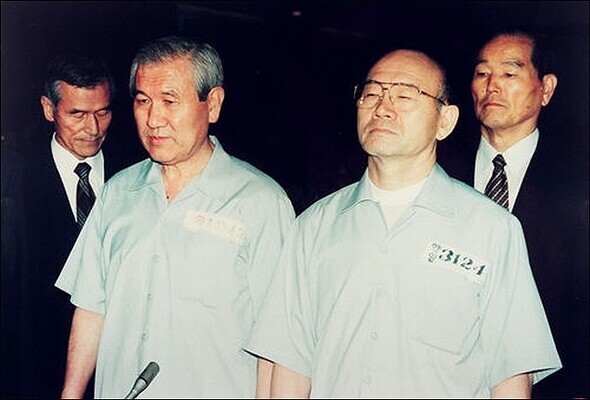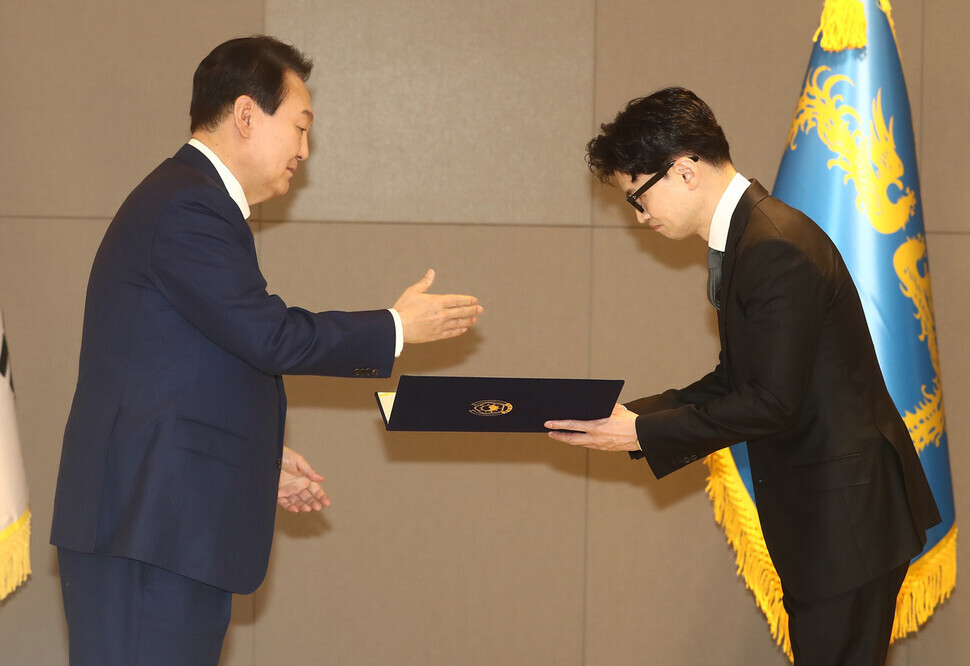hankyoreh
Links to other country sites 다른 나라 사이트 링크
[Column] Chun Doo-hwan and Roh Tae-woo, Yoon Suk-yeol and Han Dong-hoon


The military regime under Chun Doo-hwan, which usurped power in a two-phase coup in 1979 and 1980, comprised social elites. In 1951, amid the violence of the Korean War, they were the first class to enroll in a four-year officer program at the Korean Military Academy in Jinhae, South Gyeongsang Province. They were educated by the best academics in the country, who had all fled to Busan after the outbreak of the war. After they became officers, they even traveled to the US, where they were trained in special operations and psychological warfare.
Part of the twisted pride of this elite class manifested in Hanahoe, an unofficial organization that operated as a secret society within the military. President Park Chung-hee supported this organization behind closed doors. When Park was assassinated, Chun led his fellow Hanahoe members in a coup that seized political power.
When Chun’s regime became endangered by political crises in June 1987, he appointed his close friend and ally Roh Tae-woo as a presidential candidate representing the Democratic Justice Party, which Chun founded. Roh was elected president in December of that year. At this point, however, the people were calling for the punishment and removal of the Fifth Republic, the one-party state ruled by Chun from 1981 to 1987. To shield himself politically, Roh sent Chun to Baekdam Temple in Gangwon Province in November 1988. Hidden from public view, Chun spent around two years in political exile at the temple.
President Kim Young-sam effectively purged the government of former Hanahoe members. He drafted the Special Act on the May 18 Democratization Movement, on which grounds Chun and Roh were sent to prison. The power vacuum left by the purged military regime was eventually filled by a class of prosecutors.
Yet the prosecutors were simply another class of social elites. Authorized to create and lead their own investigations, prosecutors in the Special Investigations Department (now the Anti-corruption Department) wore their own badge of pride. To them, a president limited by a five-year term wasn’t much of a worry. During the Kim Young-sam administration, prosecutors started raising their glasses to a self-congratulatory toast: “Administrations are temporary, but prosecutors are forever.” As with Chun and Hanahoe, the twisted pride of a class of social elites manifested into a separate, unofficial society: the Yoon Suk-yeol division.
The concept of a just prosecutor who exercised restraint disappeared. They were free to conduct witch-hunt investigations, indict people at will, and acquit political allies with little to no consequences. Yoon effectively created his own team of prosecutors who could effectively operate with no oversight. When Yoon became president, this elite class was able to formulate its own regime.
Facing public outcries of ruling unrestrainedly in his self-interest, Yoon seems to have selected Justice Minister Han Dong-hoon, a former prosecutor, to be his party’s interim leader. There’s a saying in Korea: if the fruit is big enough, plant its seeds instead of eating it. It looks like Yoon is scrambling to plant his seeds.

Members of the People Power Party were overwhelmingly in favor of appointing Han as the interim leader on Monday. No surprise there. The People Power Party can trace its genetic origins to Park Chung-hee’s Democratic Republican Party and Chun’s Democratic Justice Party. This political DNA calls for complete obedience among its members. You do what the upper echelons tell you to do.
Although this political DNA incorporated the liberal-leaning Reunification Democratic Party, founded by Kim Young-sam, in 1990, those genes probably won’t make much of a difference. Kim Young-sam came from the old-school Democratic Party. The old school values loyalty as the highest virtue. That’s why most Reunification Democratic Party members all went along with the 1990 merger to form the Democratic Liberal Party.
What will happen if Han Dong-hoon becomes the party’s interim leader? Will he win in the 2024 general election? That won’t be easy. Politics isn’t for everybody. And neither are elections.
But the bigger problems are state affairs and the people’s livelihood. Han is a naturally gifted prosecutor. When he was a public prosecutor, people in the financial industry called him “the angel of death.” The prosecutor’s job is to seek out criminals and punish them. This requires a knack for digging through people’s past. However, this doesn’t equate to a knack for predicting the future.
Just as Yoon did, Han will probably muster all his resources to send Democratic Party leader Lee Jae-myung to prison. He will throw himself into an interminable battle against the political opposition. He will not engage with them, and he will not compromise. This will paralyze the country’s political process, and ultimately, the people of Korea will be the ones who suffer.
Han winning in the general election is not impossible, however. Politics is war. There are times when your enemy’s misstep results in your victory. If the Democratic Party breaks down or splits from internal conflict, then Han will reap the rewards.
Will Han’s victory prove beneficial to Yoon? That’s also unlikely. The absolute authority that Yoon currently wields will be transferred to Han. There have never been two suns in the sky of the People Power Party. The lame duck period could come sooner than forecasted.
No matter what happens, though, Yoon will pay the price. So why does he insist on installing Han, basically his personal avatar, as the party’s interim leader?
It’s because he hates being on the losing team. He wants to prove that prosecutors, too, can be skillful politicians. Yet this is a foolish quest. The biggest virtue of a politician is the ability to swallow one’s pride in front of the people. If you upset the people, you will pay the price. And the people do not want a former prosecutor as the People Power Party’s interim leader.
Koreans suffered for many years under an era of military dictatorships that usurped power through coups and robbed the people of their opportunity to live under a democratic constitutional republic: Park Chung-hee, Chun Doo-hwan and Roh Tae-woo. If we’re not careful, we may be entering a new authoritarian era led by prosecutors like Yoon and Han. Something I can’t bear to even imagine.
Karl Marx once said that history repeats itself: first as tragedy, second as farce. I can only hope that’s not the case this time around.
Please direct questions or comments to [english@hani.co.kr]

Editorial・opinion
![[Editorial] Korea must respond firmly to Japan’s attempt to usurp Line [Editorial] Korea must respond firmly to Japan’s attempt to usurp Line](https://flexible.img.hani.co.kr/flexible/normal/500/300/imgdb/original/2024/0514/2317156736305813.jpg) [Editorial] Korea must respond firmly to Japan’s attempt to usurp Line
[Editorial] Korea must respond firmly to Japan’s attempt to usurp Line![[Editorial] Transfers of prosecutors investigating Korea’s first lady send chilling message [Editorial] Transfers of prosecutors investigating Korea’s first lady send chilling message](https://flexible.img.hani.co.kr/flexible/normal/500/300/imgdb/original/2024/0514/7917156741888668.jpg) [Editorial] Transfers of prosecutors investigating Korea’s first lady send chilling message
[Editorial] Transfers of prosecutors investigating Korea’s first lady send chilling message- [Column] Will Seoul’s ties with Moscow really recover on their own?
- [Column] Samsung’s ‘lost decade’ and Lee Jae-yong’s mismatched chopsticks
- [Correspondent’s column] The real reason the US is worried about Chinese ‘overcapacity’
- [Editorial] Yoon’s gesture at communication only highlights his reluctance to change
- [Editorial] Perilous stakes of Trump’s rhetoric around US troop pullout from Korea
- [Guest essay] Preventing Korean Peninsula from becoming front line of new cold war
- [Column] The state is back — but is it in business?
- [Column] Life on our Trisolaris
Most viewed articles
- 1[Editorial] Transfers of prosecutors investigating Korea’s first lady send chilling message
- 2Major personnel shuffle reassigns prosecutors leading investigations into Korea’s first lady
- 3[Editorial] Korea must respond firmly to Japan’s attempt to usurp Line
- 4Korea cedes No. 1 spot in overall shipbuilding competitiveness to China
- 5[Correspondent’s column] The real reason the US is worried about Chinese ‘overcapacity’
- 6Second suspect nabbed for gruesome murder of Korean in Thailand, 1 remains at large
- 7US has always pulled troops from Korea unilaterally — is Yoon prepared for it to happen again?
- 8Korean auto industry on edge after US hints at ban on Chinese tech in connected cars
- 9Naver’s union calls for action from government over possible Japanese buyout of Line
- 10[Column] Samsung’s ‘lost decade’ and Lee Jae-yong’s mismatched chopsticks